The Lost Symbol Read online
Page 16
The man removed his hand from her mouth, and Trish gasped, inhaling deeply.
“Let me go!” she demanded, breathless. “What the hell are you doing?”
“Tell me your PIN number,” the man said.
Trish felt totally at a loss. Katherine! Help! Who is this man?! “Security can see you!” she said, knowing full well they were out of range of the cameras. And nobody is watching anyway.
“Your PIN number,” the man repeated. “The one that matches your key card.”
An icy fear churned in her gut, and Trish spun violently, wriggling an arm free and twisting around, clawing at the man’s eyes. Her fingers hit flesh and raked down one cheek. Four dark gashes opened on his flesh where she scratched him. Then she realized the dark stripes on his flesh were not blood. The man was wearing makeup, which she had just scratched off, revealing dark tattoos hidden underneath.
Who is this monster?!
With seemingly superhuman strength, the man spun her around and hoisted her up, pushing her out over the open squid tank, her face now over the ethanol. The fumes burned her nostrils.
“What is your PIN number?” he repeated.
Her eyes burned, and she could see the pale flesh of the squid submerged beneath her face.
“Tell me,” he said, pushing her face closer to the surface. “What is it?”
Her throat was burning now. “Zero-eight-zero-four!” she blurted, barely able to breathe. “Let me go! Zero-eight-zero-four!”
“If you’re lying,” he said, pushing down farther, her hair in the ethanol now.
“I’m not lying!” she said, coughing. “August 4! It’s my birthday!”
“Thank you, Trish.”
His powerful hands clasped her head tighter, and a crushing force rammed her downward, plunging her face into the tank. Searing pain burned her eyes. The man pressed down harder, driving her whole head under the ethanol. Trish felt her face pressing into the fleshy head of the squid.
Summoning all of her strength, she bucked violently, arching backward, trying to pull her head out of the tank. But the powerful hands did not budge.
I have to breathe!
She remained submerged, straining not to open her eyes or mouth. Her lungs burned as she fought the powerful urge to breathe in. No! Don’t! But Trish’s inhalation reflex finally took over.
Her mouth flew open, and her lungs expanded violently, attempting to suck in the oxygen that her body craved. In a searing rush, a wave of ethanol poured into her mouth. As the chemicals gushed down her throat into her lungs, Trish felt a pain like nothing she had ever imagined possible. Mercifully, it lasted only a few seconds before her world went black.
Mal’akh stood beside the tank, catching his breath and surveying the damage.
The lifeless woman lay slumped over the rim of the tank, her face still submerged in ethanol. Seeing her there, Mal’akh flashed on the only other woman he had ever killed.
Isabel Solomon.
Long ago. Another life.
Mal’akh gazed down now at the woman’s flaccid corpse. He grabbed her ample hips and lifted with his legs, hoisting her up, pushing forward, until she began to slide over the rim of the squid tank. Trish Dunne slithered headfirst down into the ethanol. The rest of her body followed, sloshing down. Gradually, the ripples subsided, leaving the woman hovering limp over the huge sea creature. As her clothing got heavier, she began to sink, slipping into the darkness. Bit by bit, Trish Dunne’s body settled on top of the great beast.
Mal’akh wiped his hands and replaced the Plexiglas lid, sealing the tank.
Wet Pod has a new specimen.
He retrieved Trish’s key card from the floor and slipped it in his pocket: 0804.
When Mal’akh had first seen Trish in the lobby, he’d seen a liability. Then he’d realized her key card and password were his insurance. If Katherine’s data-storage room was as secure as Peter had implied, then Mal’akh was anticipating some challenges persuading Katherine to unlock it for him. I now have my own set of keys. He was pleased to know he would no longer have to waste time bending Katherine to his will.
As Mal’akh stood up straight, he saw his own reflection in the window and could tell his makeup was badly mangled. It didn’t matter anymore. By the time Katherine put it all together, it would be too late.
CHAPTER 38
“This room is Masonic?” Sato demanded, turning from the skull and staring at Langdon in the darkness.
Langdon nodded calmly. “It’s called a Chamber of Reflection. These rooms are designed as cold, austere places in which a Mason can reflect on his own mortality. By meditating on the inevitability of death, a Mason gains a valuable perspective on the fleeting nature of life.”
Sato looked around the eerie space, apparently not convinced. “This is some kind of meditation room?”
“Essentially, yes. These chambers always incorporate the same symbols — skull and crossed bones, scythe, hourglass, sulfur, salt, blank paper, a candle, et cetera. The symbols of death inspire Masons to ponder how better to lead their lives while on this earth.”
“It looks like a death shrine,” Anderson said.
That’s kind of the point. “Most of my symbology students have the same reaction at first.” Langdon often assigned them Symbols of Freemasonry by Beresniak, which contained beautiful photos of Chambers of Reflection.
“And your students,” Sato demanded, “don’t find it unnerving that Masons meditate with skulls and scythes?”
“No more unnerving than Christians praying at the feet of a man nailed to a cross, or Hindus chanting in front of a four-armed elephant named Ganesh. Misunderstanding a culture’s symbols is a common root of prejudice.”
Sato turned away, apparently in no mood for a lecture. She moved toward the table of artifacts. Anderson tried to light her way with the flashlight, but the beam was beginning to dim. He tapped the heel of the light and coaxed it to burn a little brighter.
As the threesome moved deeper into the narrow space, the pungent tang of sulfur filled Langdon’s nostrils. The subbasement was damp, and the humidity in the air was activating the sulfur in the bowl. Sato arrived at the table and stared down at the skull and accompanying objects.
Anderson joined her, doing his best to light the desk with the weakening beam of his flashlight.
Sato examined everything on the table and then placed her hands on her hips, sighing. “What is all this junk?”
The artifacts in this room, Langdon knew, were carefully selected and arranged. “Symbols of transformation,” he told her, feeling confined as he inched forward and joined them at the table. “The skull, or caput mortuum, represents man’s final transformation through decay; it’s a reminder that we all shed our mortal flesh one day. The sulfur and salt are alchemical catalysts that facilitate transformation. The hourglass represents the transformational power of time.” He motioned to the unlit candle. “And this candle represents the formative primordial fire and the awakening of man from his ignorant slumber — transformation through illumination.”
“And… that?” Sato asked, pointing into the corner.
Anderson swung his dimming flashlight beam to the giant scythe that leaned against the back wall.
“Not a death symbol, as most assume,” Langdon said. “The scythe is actually a symbol of the transformative nourishment of nature — the reaping of nature’s gifts.”
Sato and Anderson fell silent, apparently trying to process their bizarre surroundings.
Langdon wanted nothing more than to get out of the place. “I realize this room may seem unusual,” he told them, “but there’s nothing to see here; it’s really quite normal. A lot of Masonic lodges have chambers exactly like this one.”
“But this is not a Masonic lodge!” Anderson declared. “It’s the U.S. Capitol, and I’d like to know what the hell this room is doing in my building.”
“Sometimes Masons set aside rooms like this in their offices or private homes as meditation spaces. It i
s not uncommon.” Langdon knew a heart surgeon in Boston who had converted a closet in his office into a Masonic Chamber of Reflection so he could ponder mortality before going into surgery.
Sato looked troubled. “You’re saying Peter Solomon comes down here to reflect on death?”
“I really don’t know,” Langdon said sincerely. “Maybe he created it as a sanctuary for his Masonic brothers who work in the building, giving them a spiritual sanctuary away from the chaos of the material world… a place for a powerful lawmaker to reflect before making decisions that affect his fellow man.”
“Lovely sentiment,” Sato said, her tone sarcastic, “but I have a feeling Americans might have a problem with their leaders praying in closets with scythes and skulls.”
Well, they shouldn’t, Langdon thought, imagining how different a world it might be if more leaders took time to ponder the finality of death before racing off to war.
Sato pursed her lips and carefully surveyed all four corners of the candle lit chamber. “There must be something in here besides human bones and bowls of chemicals, Professor. Someone transported you all the way from your home in Cambridge to be in this precise room.”
Langdon clutched his daybag to his side, still unable to imagine how the package he carried might relate to this chamber. “Ma’am, I’m sorry, but I don’t see anything out of the ordinary here.” Langdon hoped that now at last they could get to the business of trying to find Peter.
Anderson’s light flickered again, and Sato spun on him, her temper starting to show. “For Christ’s sake, is it too much to ask?” She plunged her hand into her pocket and yanked out a cigarette lighter. Striking her thumb on the flint, she held out the flame and lit the desk’s lone candle. The wick sputtered and then caught, spreading a ghostly luminescence throughout the constricted space. Long shadows raked the stone walls. As the flame grew brighter, an unexpected sight materialized before them.
“Look!” Anderson said, pointing.
In the candlelight, they could now see a faded patch of graffiti — seven capital letters scrawled across the rear wall.
VITRIOL
“An odd choice of word,” Sato said as the candlelight cast a frightening skull-shaped silhouette across the letters.
“Actually, it’s an acronym,” Langdon said. “It’s written on the rear wall of most chambers like this as a shorthand for the Masonic meditative mantra: Visita interiora terrae, rectificando invenies occultum lapidem.”
Sato eyed him, looking almost impressed. “Meaning?”
“Visit the interior of the earth, and by rectifying, you will find the hidden stone.”
Sato’s gaze sharpened. “Does the hidden stone have any connection to a hidden pyramid?”
Langdon shrugged, not wanting to encourage the comparison. “Those who enjoy fantasizing about hidden pyramids in Washington would tell you that occultum lapidem refers to the stone pyramid, yes. Others will tell you it’s a reference to the Philosopher’s Stone — a substance alchemists believed could bring them everlasting life or turn lead into gold. Others claim it’s a reference to the Holy of Holies, a hidden stone chamber at the core of the Great Temple. Some say it’s a Christian reference to the hidden teachings of Saint Peter — the Rock. Every esoteric tradition interprets ‘the stone’ in its own way, but invariably the occultum lapidem is a source of power and enlightenment.”
Anderson cleared his throat. “Is it possible Solomon lied to this guy? Maybe he told him there was something down here… and there really isn’t.”
Langdon was having similar thoughts.
Without warning, the candle flame flickered, as if caught by a draft. It dimmed for a moment and then recovered, burning brightly again.
“That’s odd,” Anderson said. “I hope no one closed the door upstairs.” He strode out of the chamber into the darkness of the hallway. “Hello?”
Langdon barely noticed him leave. His gaze had been drawn suddenly to the rear wall. What just happened?
“Did you see that?” Sato asked, also staring with alarm at the wall.
Langdon nodded, his pulse quickening. What did I just see?
A moment earlier, the rear wall seemed to have shimmered, as if a ripple of energy had passed through it.
Anderson now strode back into the room. “No one’s out there.” As he entered, the wall shimmered again. “Holy shit!” he exclaimed, jumping back.
All three stood mute for a long moment, staring in unison at the back wall. Langdon felt another chill run through him as he realized what they were seeing. He reached out tentatively, until his fingertips touched the rear surface of the chamber. “It’s not a wall,” he said.
Anderson and Sato stepped closer, peering intently.
“It’s a canvas,” Langdon said.
“But it billowed,” Sato said quickly.
Yes, in a very strange way. Langdon examined the surface more closely. The sheen on the canvas had refracted the candlelight in a startling manner because the canvas had just billowed away from the room… fluttering backward through the plane of the rear wall.
Langdon extended his outstretched fingers very gently, pressing the canvas backward. Startled, he yanked his hand back. There’s an opening!
“Pull it aside,” Sato ordered.
Langdon’s heart pounded wildly now. He reached up and clutched the edge of the canvas banner, slowly pulling the fabric to one side. He stared in disbelief at what lay hidden behind it. My God.
Sato and Anderson stood in stunned silence as they looked through the opening in the rear wall.
Finally, Sato spoke. “It appears we’ve just found our pyramid.”
CHAPTER 39
Robert Langdon stared at the opening in the rear wall of the chamber. Hidden behind the canvas banner, a perfectly square hole had been hollowed out of the wall. The opening, about three feet across, appeared to have been created by removing a series of bricks. For a moment, in the darkness, Langdon thought the hole was a window to a room beyond.
Now he saw it was not.
The opening extended only a few feet into the wall before terminating. Like a rough-hewn cubbyhole, the recessed niche reminded Langdon of a museum alcove designed to hold a statuette. Fittingly, this niche displayed one small object.
About nine inches tall, it was a piece of carved, solid granite. The surface was elegant and smooth with four polished sides that shone in the candlelight.
Langdon could not fathom what it was doing here. A stone pyramid?
“From your look of surprise,” Sato said, sounding self-satisfied, “I take it this object is not typical within a Chamber of Reflection?”
Langdon shook his head.
“Then perhaps you would like to reassess your previous claims regarding the legend of a Masonic Pyramid hidden in Washington?” Her tone now was almost smug.
“Director,” Langdon replied instantly, “this little pyramid is not the Masonic Pyramid.”
“So it is merely coincidence that we found a pyramid hidden at the heart of the U.S. Capitol in a secret chamber belonging to a Masonic leader?”
Langdon rubbed his eyes and tried to think clearly. “Ma’am, this pyramid doesn’t resemble the myth in any way. The Masonic Pyramid is described as enormous, with a tip forged of solid gold.”
Moreover, Langdon knew, this little pyramid — with its flat top — was not even a true pyramid. Without its tip, this was another symbol entirely. Known as an Unfinished Pyramid, it was a symbolic reminder that man’s ascent to his full human potential was always a work in progress. Though few realized it, this symbol was the most widely published symbol on earth. Over twenty billion in print. Adorning every one-dollar bill in circulation, the Unfinished Pyramid waited patiently for its shining capstone, which hovered above it as a reminder of America’s yet-unfulfilled destiny and the work yet to be done, both as a country and as individuals.
“Lift it down,” Sato said to Anderson, motioning to the pyramid. “I want a closer look.” She began mak
ing room on the desk by shoving the skull and crossed bones to one side with no reverence whatsoever.
Langdon was starting to feel like they were common grave robbers, desecrating a personal shrine.
Anderson maneuvered past Langdon, reached into the niche, and clamped his large palms on either side of the pyramid. Then, barely able to lift at this awkward angle, he slid the pyramid toward him and lowered it with a hard thud onto the wooden desk. He stepped back to give Sato room.
The director repositioned the candle close to the pyramid and studied its polished surface. Slowly, she ran her tiny fingers over it, examining every inch of the flat top, and then the sides. She wrapped her hands around to feel the back, then frowned in apparent disappointment. “Professor, earlier you said the Masonic Pyramid was constructed to protect secret information.”
“That’s the legend, yes.”
“So, hypothetically speaking, if Peter’s captor believed this was the Masonic Pyramid, he would believe it contained powerful information.”
Langdon nodded, exasperated. “Yes, although even if he found this information, he probably would not be able to read it. According to legend, the contents of the pyramid are encoded, making them indecipherable… except to the most worthy.”
“I beg your pardon?”
Despite Langdon’s growing impatience, he replied with an even tone. “Mythological treasures are always protected by tests of worthiness. As you may recall, in the legend of the Sword in the Stone, the stone refuses to give up the sword except to Arthur, who was spiritually prepared to wield the sword’s awesome power. The Masonic Pyramid is based on the same idea. In this case, the information is the treasure, and it is said to be written in an encoded language — a mystical tongue of lost words — legible only to the worthy.”
A faint smile crossed Sato’s lips. “That may explain why you were summoned here tonight.”
“I’m sorry?”
Calmly, Sato rotated the pyramid in place, turning it a full 180 degrees. The pyramid’s fourth side now shone in the candlelight.
Robert Langdon stared at it with surprise.
“It appears,” Sato said, “that someone believes you’re worthy.”
CHAPTER 40
What’s taking Trish so long?
Katherine Solomon checked her watch again. She’d forgotten to warn Dr. Abaddon about the bizarre commute to her lab, but she couldn’t imagine the darkness had slowed them down this much. They should have arrived by now.
Katherine walked over to the exit and heaved open the lead-lined door, staring out into the void. She listened for a moment, but heard nothing.
“Trish?” she called out, her voice swallowed by the darkness.
Silence.
Puzzled, she closed the door, took out her cell phone, and called the lobby. “This is Katherine. Is Trish out there?”
“No, ma’am,” the lobby guard said. “She and your guest headed back about ten minutes ago.”
“Really? I don’t think they’re even inside Pod Five yet.”
“Hold on. I’ll check.” Katherine could hear the guard’s fingers clicking on his computer keyboard. “You’re right. According to Ms. Dunne’s key-card logs, she has not yet opened the Pod Five door. Her last access event was about eight minutes ago… at Pod Three. I guess she’s giving your guest a little tour on his way in.”
Katherine frowned. Apparently. The news was a bit odd, but at least she knew Trish wouldn’t be long in Pod 3. The smell in there is terrible. “Thanks. Has my brother arrived yet?”
“No, ma’am, not yet.”

 Angels & Demons
Angels & Demons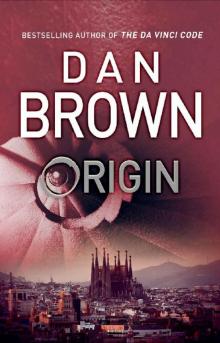 Origin
Origin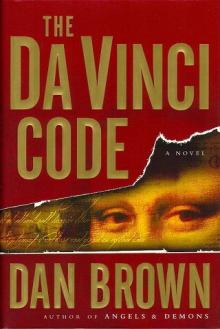 The Da Vinci Code
The Da Vinci Code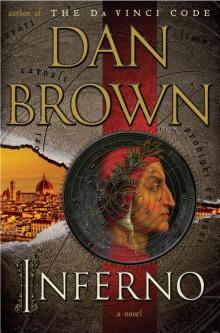 Inferno
Inferno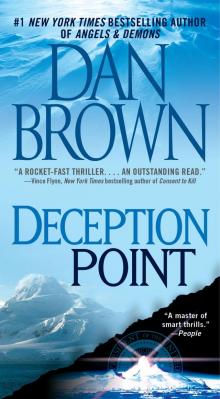 Deception Point
Deception Point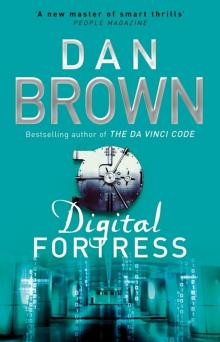 Digital Fortress
Digital Fortress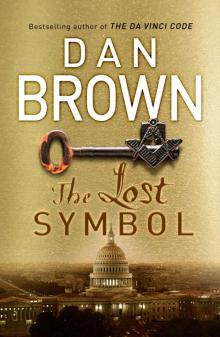 The Lost Symbol
The Lost Symbol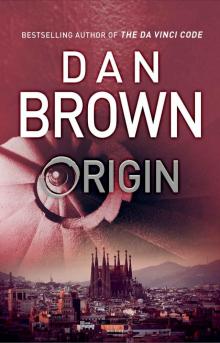 Origin: (Robert Langdon Book 5)
Origin: (Robert Langdon Book 5)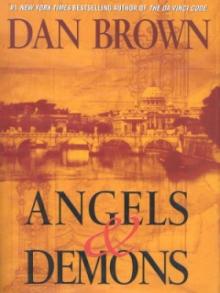 Angles & Demons
Angles & Demons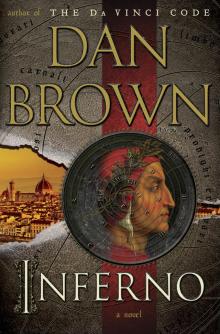 Inferno: A Novel
Inferno: A Novel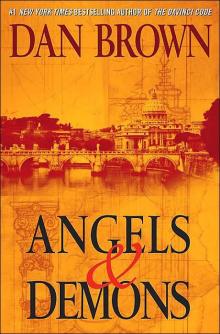 Angels & Demons rl-1
Angels & Demons rl-1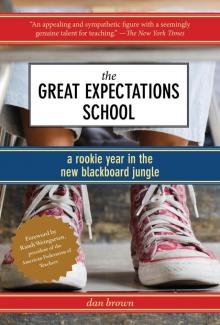 The Great Expectations School
The Great Expectations School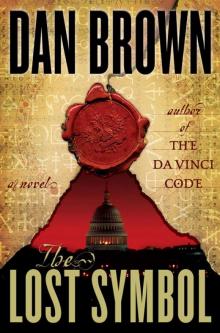 The Lost Symbol rl-3
The Lost Symbol rl-3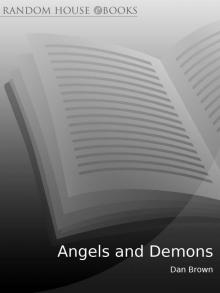 Angels and Demons
Angels and Demons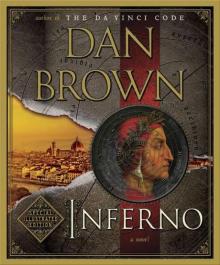 Inferno: Special Illustrated Edition: Featuring Robert Langdon
Inferno: Special Illustrated Edition: Featuring Robert Langdon